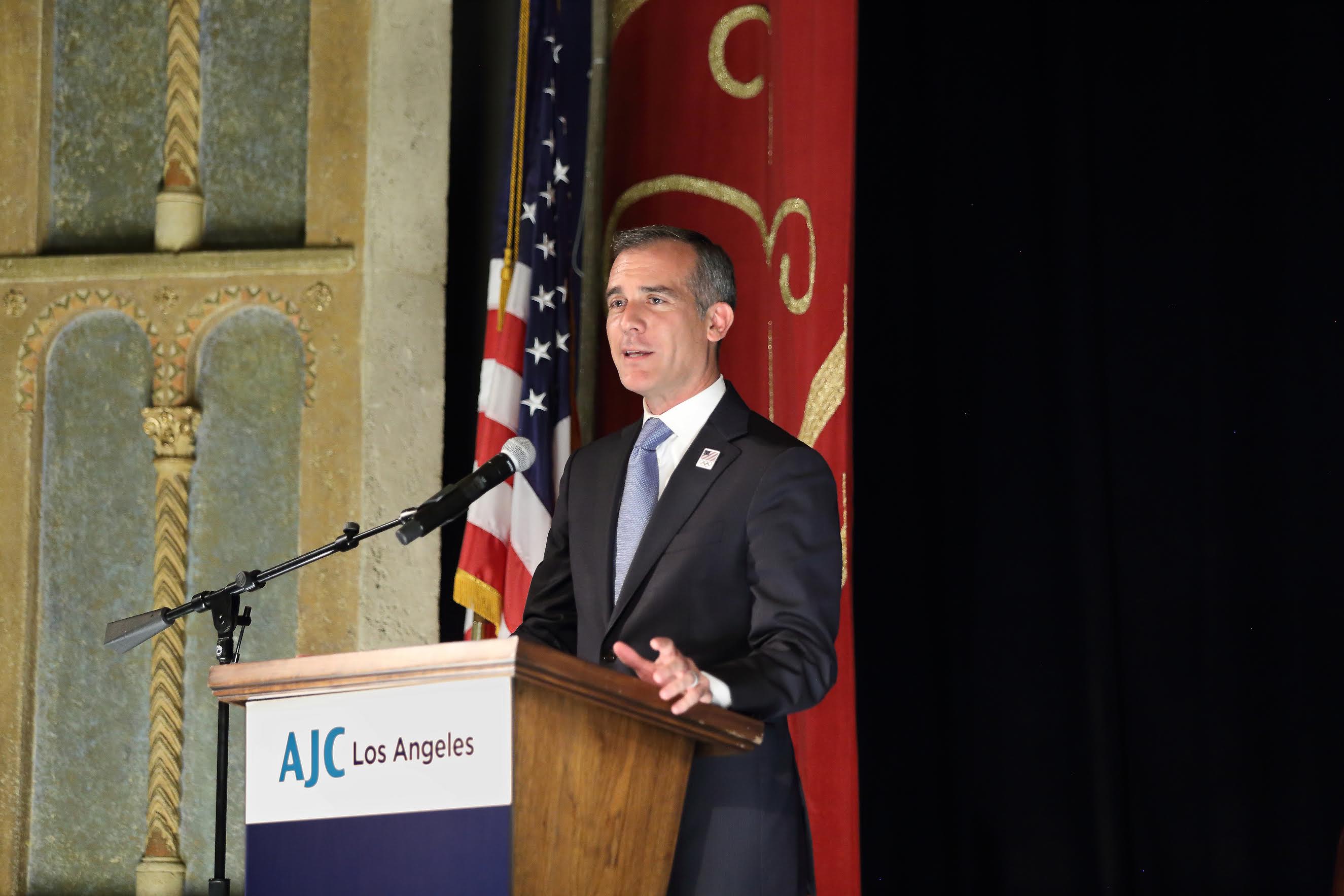 L.A. Mayor Eric Garcetti speaking at an AJC event on immigration. Photo by Howard Pasamanick
L.A. Mayor Eric Garcetti speaking at an AJC event on immigration. Photo by Howard Pasamanick Inside Wilshire Boulevard Temple on Sept. 5, Los Angeles Mayor Eric Garcetti denounced President Donald Trump’s decision announced earlier that day to rescind protections for children brought into the U.S. illegally, saying, “This is a day — a dark day — for this nation and for the city.”
Outside, left-leaning groups accused the mayor of not doing enough to protect those children.
“What do we want? Sanctuary! When do we want it? Now!” came the chants from a coalition that included Jewish Voice for Peace, Black Lives Matter, Ground Game L.A. and Democratic Socialists of America.
The event inside the synagogue, sponsored by the American Jewish Committee (AJC), had been scheduled before the announcement of Trump’s decision on Deferred Action for Childhood Arrivals, or DACA, an Obama administration initiative.
Addressing an audience of about 100, including some who turned their backs to him, Garcetti said he was disappointed in the Trump decision, calling it “un-American.”
But the mayor’s remarks were insufficient for the protesters outside.
“We are here because Mayor Garcetti, Police Chief (Charlie) Beck and Sheriff (Jim) McDonnell have had a history of talking big about how they are protecting immigrants without having the policy to back up some of their stances,” said Meghan Choi, a lead organizer with Ground Game L.A., a grass-roots civic engagement organization.
Actions like the protest outside the synagogue are becoming more common across the country, Steven Windmueller, a professor at Hebrew Union College-Jewish Institute of Religion, whose expertise includes American- Jewish political behavior, told the Journal.
“I am detecting over the past eight months, a ‘radicalization’ of the left in opposition to the current administration, contributing to the further rise of socialists, anarchists and others, who I would describe as ‘rejectionists’ opposed to the President and his policies, but also unhappy with the Democratic Party,” Windmueller wrote in an email.
Trump’s decision, announced hours before the AJC event, gave Congress six months to develop a permanent solution for the 800,000 young adults, sometimes referred to as Dreamers, who currently qualify for protection under DACA.
Garcetti, who is of Latino-Jewish ancestry, said the decision to phase out DACA was personal, given his family’s history of coming to the United States illegally.
“We didn’t have the term back then, but my grandfather, Salvador, was a Dreamer, carried over the border by my bisabuela, great-grandmother,” he said.
At times raising his voice, Garcetti called on Congress to pass legislation that would codify DACA protections. He specifically mentioned Sen. Orrin Hatch (R-Utah) and House Speaker Paul Ryan (R-Wis.), who have expressed support for Dreamers but have not pushed for legislation to permanently legalize their status.
“Thanks for the words,” Garcetti said, “but it is time for Congress to act.
“Let us explode the myth of those who want to divide us and want us to divide each other,” he said. “We can’t afford that. We can’t afford to yell at one another, and we can’t afford to buy into the myths.”
Hours before the synagogue event, the AJC released a statement condemning the president’s action against DACA.
“Dismantling DACA is a devastating blow to hundreds of thousands of young people who have benefited from the program — and who have in turn contributed to communities across the country in which they live,” Richard Fotlin, the AJC’s director of national and legislative affairs, said in the statement.
In addition to Garcetti, the AJC event featured a panel that included Sheriff McDonnell; Thomas Saenz, president and general counsel of the Mexican American Legal Defense and Educational Fund; Los Angeles Police Department Deputy Chief Horace Frank; and Los Angeles Times Staff Writer Cindy Chang. Dan Schnur, director of the AJC’s Los Angeles region, moderated.
The panel also discussed how law enforcement and immigrant communities can maintain trust with one another. That issue is at the core of a state Senate bill that would prohibit law enforcement agencies from sharing data for immigration enforcement purposes.





















 More news and opinions than at a Shabbat dinner, right in your inbox.
More news and opinions than at a Shabbat dinner, right in your inbox.